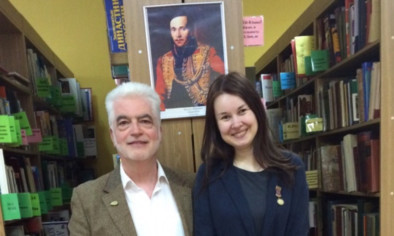When Scotland and Russia figure in the media in modern times, it tends to be in the context of RAF jets being scrambled to intercept Russian aircraft straying too close to British airspace, or because a rogue submarine has been spotted off the north coast.
But deeper, less confrontational, ties between the two countries extend far before the days of the Cold War not least in their shared reverence of Saint Andrew.
Long before the discovery of the New World and the opportunities and adventures it opened up, Russia was an appealing destination for ambitious Scotsmen.
The prism of war was certainly one factor Scottish soldiers were noted in the Grand Duchy of Muscovy in the 1300s.
It was in the 17th and 18th centuries, when Russia emerged as a major player in world affairs, that the country considerably expanded in influence and ambition. And the Scots were there in the thick of it.
An English engineer observed in 1805 that “to come from the north side of the Tweed is the best recommendation a man can bring to this city (St Petersburg), the Caledonian Phalanx being the strongest and most numerous, and moving always in the closest union”.
It’s these fascinating links which are explored by Newport-based author and broadcaster Billy Kay in a new three-part programme The Scots in Russia, which is due to begin on BBC Radio Scotland on Tuesday December 22.
In it, Billy cites a quotation from The Scots Magazine in 1739 which crystallises the rise of Scots to positions of prominence in the Russian army and navy that had begun a century earlier with soldiers of fortune such as Alexander Leslie, Patrick Gordon and Tam Dalyell of the Binns.
It reads: “At the head of the Russian fleet we find a Gordon, in the highest rank of the army a Keith, and Douglas, Lesley, and many more, send their names from the extremities of that vast empire.”
In Moscow, Billy speaks to Olga Leslie, a descendant of Alexander Lesley, whose family enjoyed a close relationship with the Tsars from the 1650s through to the Russian Revolution of 1917.
He also hears how the Scottish community increased rapidly in the 18th Century as Jacobites sought a haven where their military, medical and intellectual skills were welcomed with open arms.
Billy adds: “The penetration of influential Scots into every aspect of Russian life increased during the reign of Catherine the Great from 1762-96.
“She employed an enigmatic Jacobite architect called Charles Cameron to realise her dreams in fabulous palaces such as Tsarskoe Selo.
“Cameron placed an ad in the Edinburgh Evening Courant in 1784 for masons, smiths, bricklayers and plasterers to serve Her Majesty the Empress of all the Russias.
“The 73 artisans and their families created a Scottish colony of 140 people in Sofia. Two of them, William Hastie and Adam Menelaws, became influential architects and planners in their own right.
“Admiral Samuel Greig headed the Russian navy and he forged links with the Carron works in Falkirk, and from there came the people who industrialised Russia.
“One of them was Charles Baird, and in St Petersburg there was a saying that people used when things were running smoothly: ‘Kak u Berda na zavode” ‘It was going like Baird’s factory’.”
Elsewhere he hears from Mairi Koroleva, pictured with Billy above, a descendant of the poet Mikhail Lermontov, who was intensely aware of his Scottish roots and expressed the desire to see the land of his forefathers in his poetry.
Billy uncovers a remarkable twist to the writer’s story, saying: “Lermontov died in a duel at a place called Shotlandka or Little Scotland, the site of a former Scottish Presbyterian mission to Circassia, while his death certificate was signed by a Barclay de Tolly.
“That family, from Towie Barclay castle in Aberdeenshire, also produced the Russian hero who resisted Napoleon, Prince Mikhail Barclay de Tolly.”
From textile barons to industrialists, Scottish enterprises had a substantial presence in pre-revolutionary Russia with even the biggest department store in Moscow, Muir and Mirrielees, being Scottish owned.
However, back in Scotland, the rise of communism attracted left-wing radicals.
Billy introduces the most influential of them, John Maclean, and recalls how he first encountered the story of the “Red Clydesiders” on a previous trip to Moscow in 1968, aged 16.
He adds: “On the Kremlin Wall is a plaque to one of them, Arthur McManus, and the mausoleum containing the body of Lenin, who described the most famous of them along with Karl Liebknecht as one of those ‘isolated heroes who have taken upon themselves the arduous role of forerunners in the world revolution’.
“It was the first time I had heard of the great John Maclean, and his radical cry, ‘All hail the Scottish Workers Republic’.”
The Scots in Russia, presented by Billy Kay, airs on BBC Radio Scotland on December 22, 29 and January 5 at 1.32pm. It is repeated the following Sundays at 7.03am and is available on the BBC iPlayer for 30 days.
